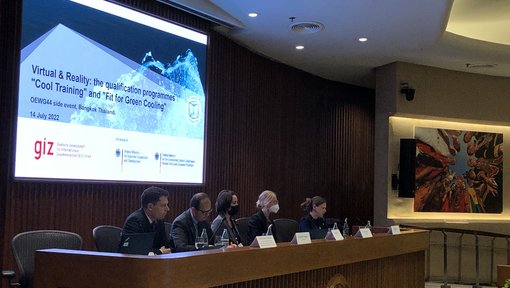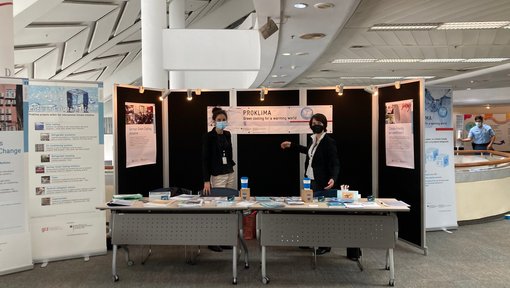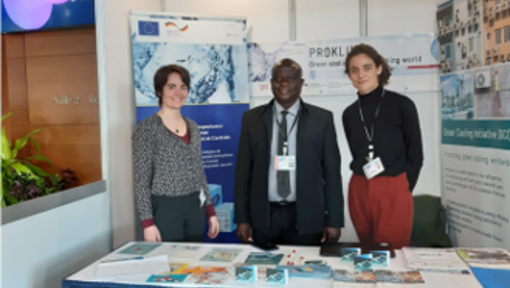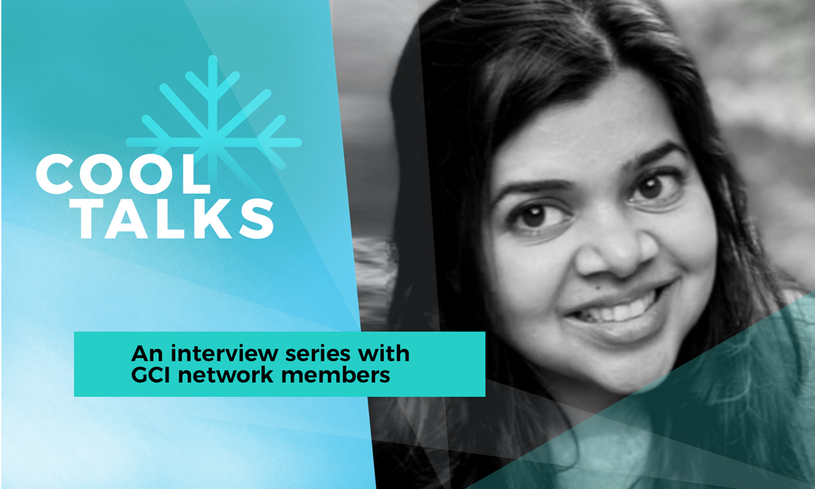Avipsa Mahapatra first experienced the tension between climate protection and economic imperatives during her childhood in India. Today she is Climate Campaign Lead at EIA U.S. and talks with us about her personal 'ikigai' and her vision of an HFC-free future.
With their high global warming potential, HFCs are among the fastest growing greenhouse gases worldwide. The internationally active Environmental Investigation Agency (EIA) has set itself the goal of reducing these "super pollutants" and is campaigning for the phase-out of HFCs in the HVAC sector. Back in the mid-1990s, the non-profit organisation began its work on ozone and climate protection with investigations into the illegal trade of ozone-depleting substances.
"Cooling has to be key part of any net zero targets," stresses Avipsa Mahapatra of the EIA U.S. office in Washington D.C. As Climate Campaign Lead, she leverages policy, technology and investigations to make the cooling industry more climate-friendly. In addition to raising awareness for natural refrigerants and energy efficiency, Avipsa Mahapatra and her colleagues support countries in the technical conversion, the development and implementation of standards, and expose the illegal trade in ODS.
Avipsa, what is your professional background and how long have you been working in this field?
My academic background is in Climate Science and Public Policy. Before joining EIA, I worked in academic and non-profit roles researching, developing, doing and advocating for actions that protect our planet and its species, from human-caused damage. I have been closely engaged with the youth climate movement since college and was an official youth delegate at the UN climate talks. As the climate talks were collapsing (around Copenhagen 2010), I joined a non-profit in India developing and implementing a community-led carbon-neutrality program in the Himalayas. I managed to get a couple of Master’s degrees in both science and policy, and experiences in countries as diverse as Norway and Vietnam, eventually joining EIA in 2012 to rid the world of HFCs.
Your role as youth delegate at the UN climate talks shows that you have been involved in climate protection from a young age. Where did your personal motivation for the topic originate?
My grandfather was a rice farmer in Odisha, still one of the poorest and most climate-vulnerable regions in India. He had no electricity and would pray for the arrival of monsoons, so he could feed his family. His generation saw 'economic growth' even if it meant it’d cost them clean air and water as the only way out of poverty and hunger.
I grew up in overcrowded megacities like Mumbai where failure of the commonly believed paradigm of economic development was obvious in vivid examples of people without basic rights of life: adequate food, clean water, clean air and a decent livelihood. I became aware at a very young age that unfortunately those hit hardest by pollution contribute the least to it (including carbon pollution) and that environmental issues are at the end of the day social issues. These days finally the public discourse is turning to the idea that social justice and environmental and climate protection cannot exist as separate battles.
Cool Talks: What are they?
In our "Cool Talks" interview series, members of the Green Cooling Initiative Network share their vision of Green Cooling. The GCI Network is an alliance of key players in the refrigeration, air-conditioning & foam sector. It comprises government institutions, international organisations and the private sector. They are united on one goal: the transformation of the cooling sector – for the benefit of people, the environment, and our shared future.
After you joined EIA in 2012, one of your biggest environmental battles was the fight against climate-damaging refrigerants, so-called HFCs. What is your greatest success in this particular field so far?
It is difficult to pick one! In terms of direct impact on emissions, I led the investigative team that exposed a massive illegal production and trade of CFC-11 that led to enforcement action on the ground and some institutional changes that will save millions of tons of emissions from continuing to enter the atmosphere undetected.
Our climatefriendlysupermarkets.org initiative to hunt down super pollutants by asking public to submit their neighbourhood grocer or supermarket to our climate-friendly supermarkets map also brings me joy as I see more and more people care about what refrigerants supermarkets are using in their stores and the world map getting more and more green dots every day!
What would an ideal RAC sector look like in the future?
Ideally, the RAC sector would be a part of the solution to the climate crisis, rather than contributing to the problem. So not just reducing environmental and climate destruction by adopting natural refrigerants and more efficient products, but by fundamentally lowering the cooling and heating needs in the first place and then fulfilling the remaining needs with the least impact on the planet, from 'cradle to grave'.
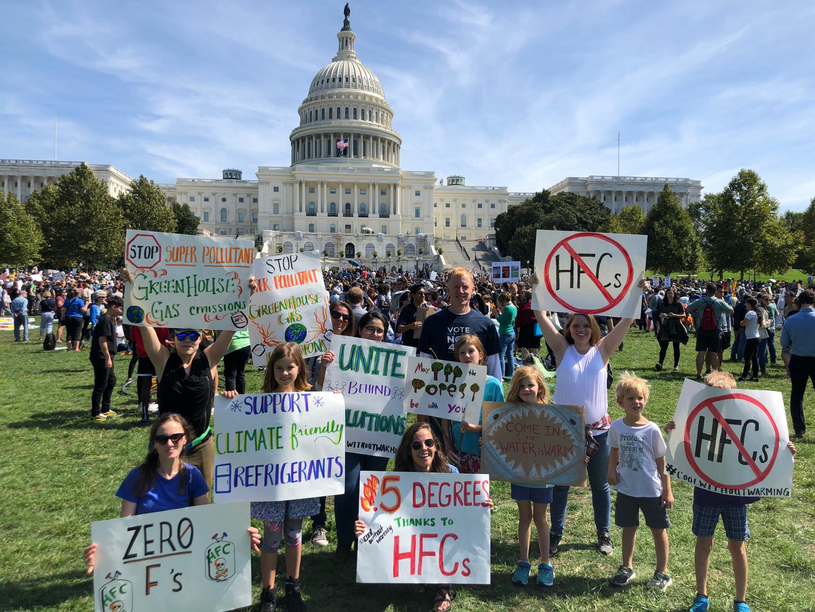
Speaking of ‘lowering the cooling needs’: Do you have air conditioning at home? And if so, is it climate-friendly?
No, you see I live in the United States (smiles). However, I live in a colder coastal State with several months of winter which combined with my tropical upbringing means it is only warm enough a few days in a year to need the air conditioning in my house.
Unfortunately, even my refrigerator (which comes with the house and I did not get to choose) is still a 2012 model that uses HFC! Which is of course a shame, given I grew up with a HC fridge in India several decades ago. This is one of the key reasons, we campaigned to bring the US domestic refrigerator sector to the 21st century and American buyers today in the market for a household refrigerator finally have a number of options in the store.
Please complete...
The biggest obstacle for Green Cooling at the moment is…
"the entrenched interests of the fluorochemical industry to continue business-as-usual and only make incremental changes to maximize profit."
There should be more women in refrigeration and air conditioning because…
"more women would mean more innovation and of course, fewer boring ‘manels’ in a world primarily designed by men for men. On a more serious note, now more than ever, more women can help fill the workforce shortage while also expanding the industry's diversity. We are in a climate crisis and the HVAC industry can play an outsized role in both dealing with its impacts as well as contributing to it. For the cooling industry to be impactful, we need all the diverse voices, experiences and expertise."
I love my job because…
"it is a privilege to get to work with amazingly dedicated people to solve one of the fundamental challenges facing our planet. It is not simply a job, it is something I genuinely love doing and strongly believe that the world needs. It is indeed my 'ikigai'." (meaning of life)

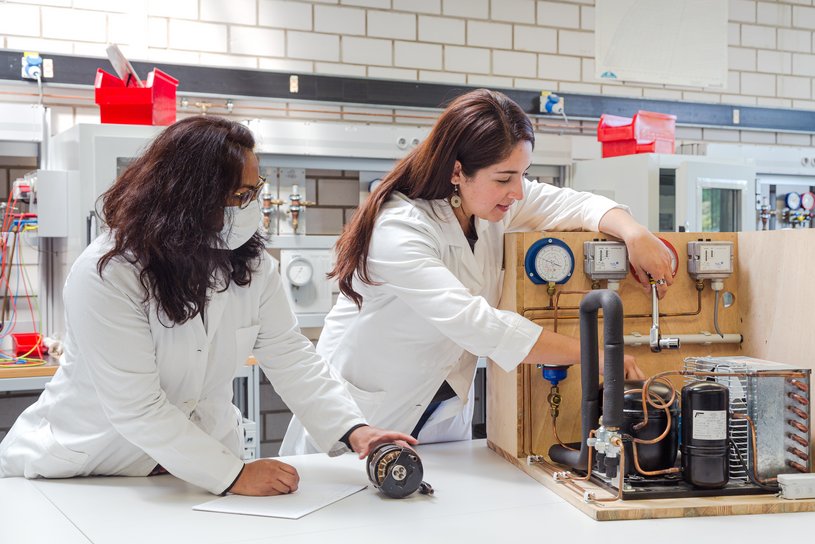 Image: giz / Andreas Döring
Image: giz / Andreas Döring